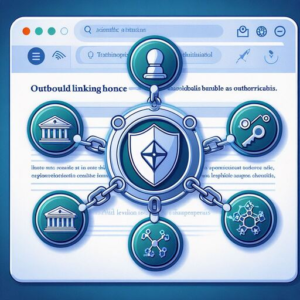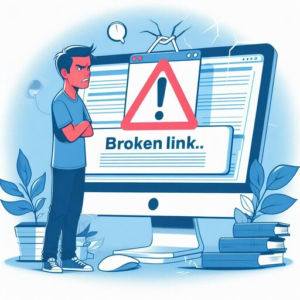In the vast expanse of the internet, envision websites as interconnected islands, forming the backbone of our digital landscape.
The links acting as bridges between these islands hold immense significance, determining the flow of our online exploration. Amidst these links, there exists a unique entity known as outbound links, akin to special pathways guiding users from one island (website) to another.
These pathways play a pivotal role in our online navigation, enhancing the overall quality of our digital journey.
This article aims to unravel the essence of outbound links, shedding light on their definition, highlighting their importance, and providing insights into utilizing them effectively.
By understanding and leveraging these virtual pathways, we can optimize our websites, creating an even more enriching and seamless online experience for users.
What are Outbound Links?
Outbound links, also referred to as external links or outgoing links, are hyperlinks embedded within a specific webpage that redirect users to another website.
In simpler terms, interacting with an outbound link involves clicking on it, subsequently transitioning from the current website to a different online destination.
The primary purpose of these links is to guide users towards related content, references, or additional resources hosted on external websites, enriching their online experience by providing diverse and relevant information.
Why Outbound Links Matter
Outbound links contribute to the overall health and functionality of a website in several ways. Let’s delve into their significance:
Providing Additional Information:
Outbound links serve as virtual pathways, akin to a digital reference library, allowing readers to delve deeper into a topic.
These links offer users the opportunity to explore additional details, alternative perspectives, or supplementary information related to the content they are currently engaged with.

Much like navigating the various sections of a library, users can follow outbound links to broaden their understanding and gain a more comprehensive view of the subject matter.
Building Credibility and Trust:
The inclusion of outbound links to reputable sources is a strategic move for websites aiming to enhance their credibility.
When a website links to authoritative references, it signals to users that the information presented is well-researched and supported by reliable sources. This not only strengthens the content’s validity but also builds trust with the audience, establishing the website as a trustworthy and knowledgeable resource within its niche.
Improving User Experience:
Outbound links significantly contribute to a richer user experience by offering readers a more expansive and holistic view of a subject.
When users discover valuable and relevant content through outbound links, they are more likely to view the host website as a valuable resource.
This enhancement of user experience fosters a positive relationship between the audience and the website, encouraging users to return for future information needs.
SEO Benefits:
In addition to the user-centric advantages, outbound links carry SEO benefits that contribute to a website’s visibility on search engines. Search engines, such as Google, perceive outbound links as signals of a well-connected and informative website.

While the primary focus should always be on providing value to users, the positive outcome of improved search rankings adds another layer of significance to the strategic use of outbound links. This dual impact underscores the importance of incorporating outbound links thoughtfully to benefit both users and the website’s overall online presence.
How to Use Outbound Links Effectively
Now that we understand the importance of outbound links, let’s explore some strategies to use them effectively:
Relevance is Key:
Ensuring that outbound links are relevant to your content is paramount for maintaining coherence and adding value to your website.
By linking to sources that align with the topic at hand, you provide users with additional insights and perspectives, enriching their understanding of the subject matter. Moreover, relevant outbound links help to establish your website as a trusted source of information within your niche, enhancing its credibility and authority.
Quality Over Quantity:
While it may be tempting to include numerous outbound links, prioritizing quality over quantity is essential for maintaining the integrity of your content.

Focus on selecting a few well-chosen, high-quality links that offer valuable information and insights to your audience. Avoid diluting the user experience with an excess of links that may distract or overwhelm readers.
By curating a selection of top-notch outbound links, you demonstrate your commitment to providing trustworthy and reliable resources to your audience.
Diversify Your Links:
Offering a diverse range of outbound links adds depth and richness to your content, catering to the varied interests and preferences of your audience.
Incorporate a mix of educational resources, reputable news articles, industry reports, and other relevant websites to provide a comprehensive perspective on the topic.
This diversity not only enhances the user experience but also showcases the breadth of your research and knowledge. Additionally, diversifying your links can help attract a wider audience and foster connections with other websites in your field.
Use Descriptive Anchor Text:
When embedding outbound links in your content, pay careful attention to the anchor text—the clickable text that users see. Opt for descriptive anchor text that accurately reflects the content of the linked page, giving users a clear idea of what to expect when they click on the link.
Avoid generic phrases like “click here” or “read more” and instead use specific keywords or phrases that provide context and relevance. By using descriptive anchor text, you improve the accessibility and usability of your content, helping users navigate your website with ease and confidence.
Conclusion
In conclusion, outbound links play a vital role in creating a well-connected and user-friendly website.
When used effectively, they contribute to a positive user experience, build credibility, and provide valuable resources for your audience.
Remember to prioritize relevance, quality, and diversity when incorporating outbound links into your content. By doing so, you’ll not only enhance your website’s credibility but also contribute to the broader ecosystem of information on the internet.
In the ever-evolving digital landscape, outbound links serve as bridges connecting websites and fostering a collaborative online environment.
As you navigate the vast sea of information, consider outbound links as guiding lights, leading you to a wealth of knowledge beyond the shores of a single webpage.






